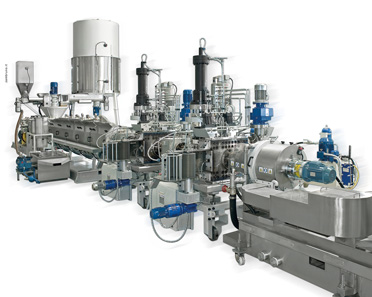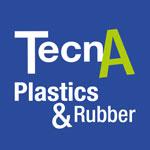 Recycling and compounding line with co-rotating twin-screw extruder
Recycling and compounding line with co-rotating twin-screw extruder
Binova plants are able to process, in one single step, what normally is made in two: recycling and compound.
This technology is able to process the post-consumer polyolefin material in the shape of ground sheet coming from a washing line.
The pellet obtained guarantees a high-quality final product.
Despite the origin, by using dual automatic filtration, Binova is able to guarantee to the end user, the possibility to produce films with thicknesses of about 20 microns.
The line in question uses a co-rotating twin-screw extruder which can produce between 1400 and 1800 kilograms per hour according to the material introduced.
The plant is able to compound post-industrial waste with high residual moisture (up to 8%) with particular blends of pellets. The presence of a high-vacuum degassing system distributed over almost the entire length of the extruder barrel (3 vacuum degassing flues and 1 atmospheric exhaust flue) allows the granulation of highly printed films; up to 80% of printed area. The mixing of the raw materials, which occurs directly in the machine, leads to a perfectly homogeneous material able to increase the quality of the final product.
The dosing system of the various materials can be both gravimetric or volumetric. A new gravimetric control system for ground film, although with a bulk density of around 0.05 kg/dmc, has been patented and developed within the research and development department of Binova: this guarantees the exact percentage of ground sheet which will feed the extruder.
The production of this technology is entirely made in Italy, with particular attention to the quality of all the components.
Competitiveness in a single step
Being able to perform this process in a single step makes BiReC lines very competitive.
With this plant Binova is very competitive, for the moment it offers customers something unique. In addition to the reduced handling of the materials inside the factory, another very important thing is the proven reduction in energy consumption compared to other plants on the market today: for LDPE based polyolefin materials, consumption will not be higher than 0.26/0.27 kW/kg whereas for polypropylene or polystyrene based materials, such as PP, PS or HIPS, a consumption around 0.22/0.23 kW/kg (excluding the cooling of the process water).
Compared to a traditional line with a single-screw, here there is almost 30% of energy saving due to the co-rotating twin screw which has a higher degree of optimization.
This plant was projected to meet the specific needs of a customer who wanted to obtain the same product with higher yields, but it is perfectly suited to the demands of the entire market.
Software and remote control
The line is equipped with a software that controls the whole production, even in the event of high working rhythms. The plant is equipped with an automatic OP control panel with Internet connection, which can also be managed remotely. In this way, the technician or the production manager can check the status of the process data of the line, even at a distance, from their smartphones.






